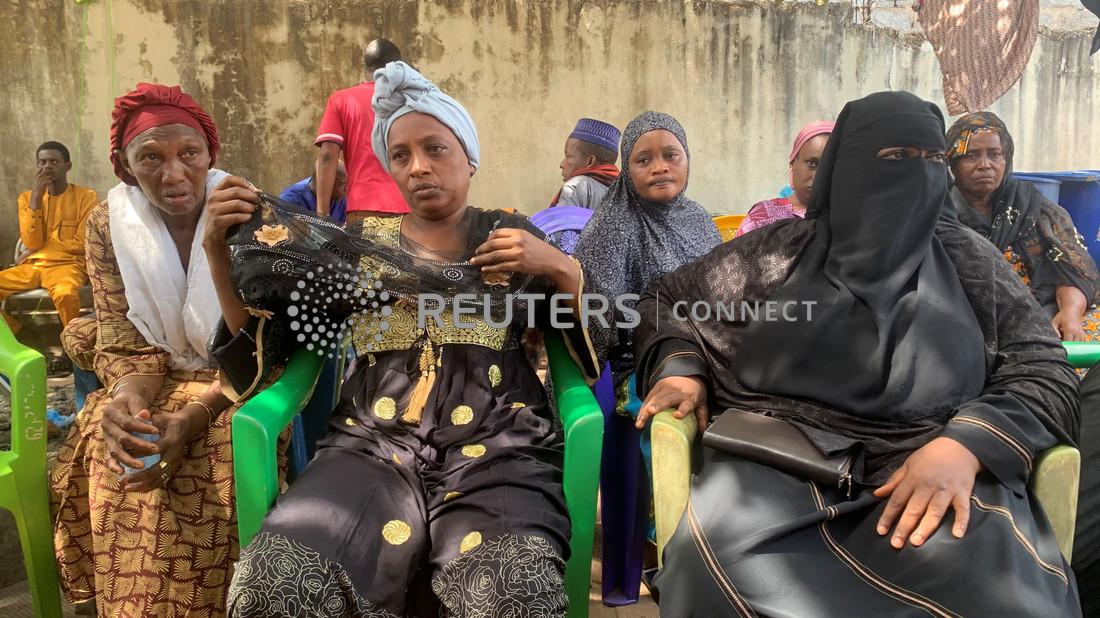CONAKRY (Reuters) – With the acrid smell of burning tyres hanging in the air, Conakry resident Mariame Diallo pointed to blood splatters on a wall where she said her teenage brother was shot at close range during a protest against Guinea’s military government on May 11.
“I will never forgive those who killed him,” she said between bouts of quiet crying.
Clutching a bag of blood-soaked clothes that she hopes will be used for a police investigation that has yet to begin, she recalled how her apprentice brother, Boubacar, fearing the anti-government demonstrations, stayed at home, only to be shot dead by police in front of the family house.
A spokesman for Guinea’s government did not respond to a request for comment.
Boubacar was one of seven people killed that day in the West African nation as anti-government protests and violent clashes with security forces gain momentum over frustrations with military leaders overseeing a promised return to democratic rule.
Smoke billowing from burning tyres and other debris has become a common sight in the capital Conakry since fuel price hikes triggered a first major protest against the military government last June.
Many more protests have followed. At least 32 were injured in unrest this month, and the army was deployed to quell planned demonstrations in the capital last week.
It was the latest clampdown as anger mounts against juntas that have seized power in a series of coups in the West and Central Africa region since 2020, with frustrations growing over the slow pace of a planned return to constitutional rule.
Transitional authorities in Burkina Faso and Mali have also grown increasingly hostile towards critics who have highlighted their failures to protect citizens from jihadist insurgents – a factor that helped spur the military takeovers.
In Guinea, opposition political parties had at first cautiously welcomed the September 2021 coup that ousted long-serving President Alpha Conde, who sparked anger for changing the constitution to allow him to run for a third term.
But relations with junta leader Colonel Mamady Doumbouya soured after main opposition parties rejected a 36-month transition to elections approved by the interim parliament last May.
Doumbouya’s government banned all public demonstrations in response and has since cracked down on the string of street protests that followed, drawing rebuke from rights groups and the United Nations.
At least 24 people have been killed since June and dozens arrested, including high-profile activists, opposition parties and civil society groups say.
Authorities have acknowledged “victims” but not given a figure.
“The military junta can’t give us hope and then act even worse than the regime it replaced,” said Conakry resident Souleymane Bah, 34, adding that people wanted military junta to organise elections.
Last October, the government cut its transition timeline to two years after the Economic Commission for West African States rejected its three-year transitional plan.
“We plan to respect all the deadlines,” said junta spokesman Ousmane Gaoual Diallo.
This has failed to appease opposition parties.
“We have reached a blocking point because we are dealing with a military junta who does not want a dialogue,” said Aliou Conde, vice-president of the main opposition UFDG party, whose leader fled the country last year after authorities accused him of corruption.
“At this rate, I fear we are heading straight into a wall,” he warned.
Last week, angry crowds gathered around the grieving relatives and friends of people killed in the latest unrest. Many were crying and holding up pictures of their loved ones on their phones.



